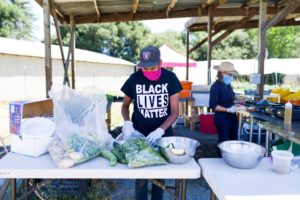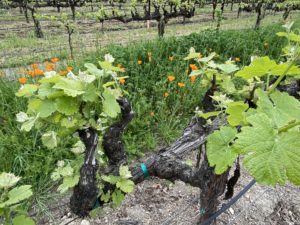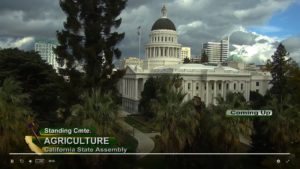Ending the Year On a High Note. Increasing Our Impact in the Golden State.
In the nation’s leading agricultural state, American Farmland Trust finishes the year with a few highlights from our last quarter.
Bringing Voices to Diverse Farmers

Whether it was Radical Family Farm with Asian heritage foods, Motley Crew Ranch with pastured-raised livestock, or Soul Food Farm who suffered from a devastating wildfire, AFT shared the stories of different small farms throughout California demonstrating the beauty and diversity of our food system.
AFT’s Carmen Carrasco brings a fresh perspective about often-marginalized farmers from different cultures and races. Don’t miss the newly published Farms for a New Generation webpage with resources in Spanish and English.
AFT appreciates the role women play in California agriculture and the need for further recognition of their important contributions. Check out this recent post from AFT’s Caitlin Joseph about lessons learned about our Women for the Land program 2020.
Rolling Out Tools to Assist with Scaling-up Regenerative Agriculture

Farmers need proof that regenerative agriculture is worth the investment. To encourage the adoption of these growing practices, AFT demonstrated the economic and environmental benefits of soil health practices with California farmers. Recently, we trained more than 200 agricultural service providers on the methods.
See our newly released tool kit, which provides step-by-step guidelines for writing and developing these case studies.
Scaling–up regenerative agriculture can run into funding barriers, because justifying outcomes from conservation practices is difficult.
For that reason, AFT developed a new resource outlining several easy-to-use tools to quantify the benefit of conservation practices on agricultural lands for water quality, climate, social, and economic factors.
We hope to see our partners integrate these tools into their projects to get the most benefit from their efforts and encourage these growing practices statewide.
Read “A Guide to Water Quality, Climate, Social, and Economic Outcomes Estimation Tools: Quantifying Outcomes to Accelerate Farm Conservation Practice Adoption.”
Driving Policy for a Resilient and Equitable Food System
 AFT continues to work to elevate policymakers’ understanding and appreciation of protection of our state’s invaluable agricultural land. In October, we hosted a webinar with California Rangeland Trust called “The Hidden Values of Rangeland and Farmland.” Watch.
AFT continues to work to elevate policymakers’ understanding and appreciation of protection of our state’s invaluable agricultural land. In October, we hosted a webinar with California Rangeland Trust called “The Hidden Values of Rangeland and Farmland.” Watch.
Wildfire has had a devastating impact on agricultural land this year but it clearly also is part of the solution in mitigating future impacts. I testified in November at an informational hearing of the California Assembly’s Agriculture Committee: “Wildfire Impacts on California Agriculture.” AFT’s testimony was centered on agricultural-based wildfire mitigation.
Recently we published AFT’s 2021 policy priorities for California’s agricultural future. AFT’s Katie Patterson wrote an open letter to Governor Newsom to address these concerns and support a resilient food system.
Bringing New Land Protection Capacity to California Team
In closing, AFT California would like to welcome our newest team member, Stacy Shutts, our new California climate and agriculture program manager.
Stacey will play a lead role in AFT’s San Joaquin Land and Water Strategy and our conservation easement projects. She joins us from Okanagan Land Trust in Washington state, where she was executive director, solidifying conservation easements and performing stewardship monitoring. Past stints include coordinating sustainability programs at NASA (helping to design a biodigester for Mars), serving as a naturalist and wetland researcher in Alaska, and working with farmers as a Peace Corps volunteer in Paraguay. She speaks Spanish, Guarani, and signs ASL, and studied environmental management and protection at California Polytechnic State University in San Luis Obispo.
On behalf of all of us at AFT, please accept our warmest wishes for a safe and happy holiday season. Here’s to a great 2021.

